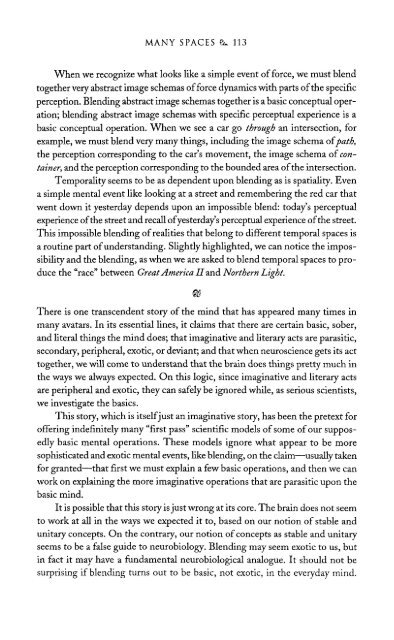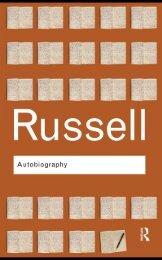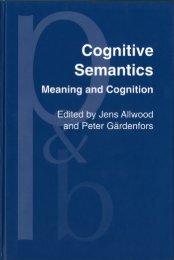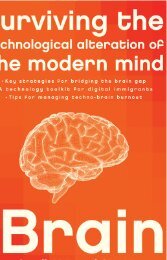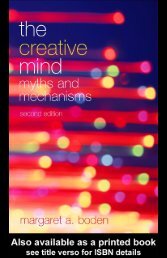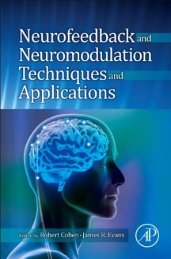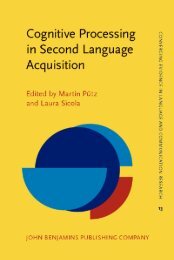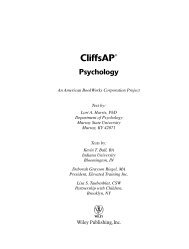The Literary Mind.pdf
The Literary Mind.pdf
The Literary Mind.pdf
You also want an ePaper? Increase the reach of your titles
YUMPU automatically turns print PDFs into web optimized ePapers that Google loves.
MANY SPACES 113<br />
When we recognize what looks like a simple event of force, we must blend<br />
together very abstract image schemas of force dynamics with parts of the specific<br />
perception. Blending abstract image schemas together is a basic conceptual operation;<br />
blending abstract image schemas with specific perceptual experience is a<br />
basic conceptual operation. When we see a car go through an intersection, for<br />
example, we must blend very many things, including the image schema of path,<br />
the perception corresponding to the car's movement, the image schema of container,<br />
and the perception corresponding to the bounded area of the intersection.<br />
Temporality seems to be as dependent upon blending as is spatiality. Even<br />
a simple mental event like looking at a street and remembering the red car that<br />
went down it yesterday depends upon an impossible blend: today's perceptual<br />
experience of the street and recall of yesterday's perceptual experience of the street.<br />
This impossible blending of realities that belong to different temporal spaces is<br />
a routine part of understanding. Slightly highlighted, we can notice the impossibility<br />
and the blending, as when we are asked to blend temporal spaces to produce<br />
the "race" between Great America II and Northern Light.<br />
<strong>The</strong>re is one transcendent story of the mind that has appeared many times in<br />
many avatars. In its essential lines, it claims that there are certain basic, sober,<br />
and literal things the mind does; that imaginative and literary acts are parasitic,<br />
secondary, peripheral, exotic, or deviant; and that when neuroscience gets its act<br />
together, we will come to understand that the brain does things pretty much in<br />
the ways we always expected. On this logic, since imaginative and literary acts<br />
are peripheral and exotic, they can safely be ignored while, as serious scientists,<br />
we investigate the basics.<br />
This story, which is itself just an imaginative story, has been the pretext for<br />
offering indefinitely many "first pass" scientific models of some of our supposedly<br />
basic mental operations. <strong>The</strong>se models ignore what appear to be more<br />
sophisticated and exotic mental events, like blending, on the claim—usually taken<br />
for granted—that first we must explain a few basic operations, and then we can<br />
work on explaining the more imaginative operations that are parasitic upon the<br />
basic mind.<br />
It is possible that this story is just wrong at its core. <strong>The</strong> brain does not seem<br />
to work at all in the ways we expected it to, based on our notion of stable and<br />
unitary concepts. On the contrary, our notion of concepts as stable and unitary<br />
seems to be a false guide to neurobiology. Blending may seem exotic to us, but<br />
in fact it may have a fundamental neurobiological analogue. It should not be<br />
surprising if blending turns out to be basic, not exotic, in the everyday mind.


